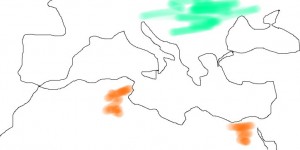Catching up on some blog reading, I came across a post by post-communist Eurasia expert Lucan Way over at the Monkey Cage blog (link). He makes the following points,
Above all, Egypt does not benefit from a pro-democratic external environment in the form of the European Union that greatly facilitated democratization in countries such as Romania, Serbia, and Slovakia. Thus, with the possible exception of Mongolia, the fall of Communism has led to full democratization only in central and south-eastern Europe where the EU has offered the possibility of membership…Furthermore, in stark contrast to the color revolutions in the early 2000s, protests in Egypt (and even more strikingly in Tunisia) lack clear leadership. In Ukraine in 2004, opposition strategized for months how best to use demonstrations to oust President Kuchma. In both Tunisia and Egypt, protests were almost completely spontaneous and took almost everyone by surprise. While the heavy reliance in Egypt on spontaneous organization by citizens newly involved in politics is inspiring, the apparent dearth of organized opposition makes it more likely that Mubarak will be able to wait out the protests.
I will take for granted that Way knows what he’s talking about in suggesting that the pro-democratic external environment and leadership were important factors in establishing democratic trajectories in Eastern Europe. The differences that Way highlights suggest what the US and Europeans could do to productively engage the transitions in Egypt and Tunisia. That is, American and European policy could aim to fill at least the first gap—that of “a pro-democratic external environment” that could motivate democratic deepening. The second leadership gap might be one that internal forces should be left to handle on their own. Of course, this kind of policy formulation presumes a genuine interest in seeing such democratic deepening.

